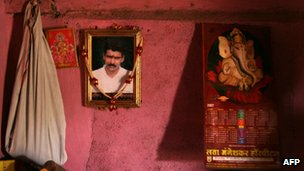Why are young Indians killing themselves?
- Published
- comments

Suicide has become the second leading cause of death among young Indians
In the end, wrote Albert Camus, one needs more courage to live than to kill oneself.
If new research is to be believed, a disturbingly high number of young Indians are losing the courage.
A study, external published in the medical journal The Lancet shows that suicide has become the second leading cause of death among the country's young adults, after road accidents in men, and childbirth-related complications in women.
There were 187,000 deaths from suicides in India in 2010, the study says - this is higher than the official figure of 134,599 suicide deaths from the National Crime Records Bureau, external. (Researchers attribute this gap to under-reporting or misreporting as friendly or bribe-seeking coroners often sign off suicide deaths as ones caused by accidents to protect the victim's family from police harassment and social stigma.)
If the findings by a team of doctors are to be believed, 40% of the men and 56% of the women who took their lives in 2010 were aged between 15 and 29 years.
The suicide rate in Indian women aged 15 years or older is more than two and a half times greater than it is in women of the same age in high-income countries, and nearly as high in China. The corresponding rate in men in the same group is between one to two times greater in men of the same age in high-income countries.
I asked Dr Vikram Patel, a leading Goa-based psychiatrist and professor at the London School Of Hygiene and Tropical Medicine, external, who co-authored the study, about why he thought this was happening.
He believes that joblessness for men and post-marriage problems for women trigger off a lot of these suicides. "In women it manifests in depression, in men it becomes a drinking problem," he says.
India is a society steeped in the patriarchal tradition, where most women are still expected to stay at home, and bring up children. But more and more women are stepping out to work and aspiring to be independent and successful. But pressures of family, demands for dowry and domestic harassment - and violence - push many such young, married women over the edge in the country's teeming cities and towns.
"This is what I call the aspirational reality gap," says Dr Patel. "Exposure to global media, education doesn't match up to the realities at home. A touch of anomie worsens matters. Suicide is seen as a potential way out of it." Perhaps not surprising in a society which lives with one foot in tradition, and the other in modernity.